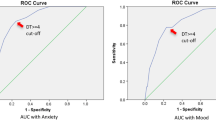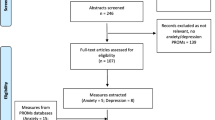Abstract
Purpose
The objective of this study was to examine the likely presence of, and factors associated with, anxiety, depression and overall psychological distress in cancer outpatients undergoing radiation therapy treatment in Sydney, Australia.
Methods
A touchscreen computer survey was conducted in four radiation therapy treatment centre waiting rooms. Patients waiting to receive treatment completed the survey which included questions about demographic and disease characteristics, survey acceptability and the Hospital Anxiety and Depression Scale (HADS).
Results
A total of 454 patients (70 %) completed the touchscreen computer survey. The likely presence of anxiety (HADS-A ≥11), depression (HADS-D ≥11) and overall psychological distress (HADS-T ≥15) was 15, 5.7 and 22 %, respectively. Cancer type was found to be associated with each HADS screening category. The majority of patients reported high survey acceptability and willingness to complete similar touchscreen computer surveys in the treatment centre waiting room on additional occasions.
Conclusions
As radiotherapy patients frequently attend the radiation oncology department, routine screening and intervention for elevated levels of psychological distress in this setting appears to be feasible. High survey completion rates and high patient-rated acceptability support this approach to screening. The likely presence of psychological distress is reported for this sample; however, the selection of HADS threshold scores is likely to have influenced the reported rates. Further research is needed to identify how cancer type impacts on likely caseness across the different HADS classifications examined.
Similar content being viewed by others
References
Ferlay J, Shin H-R, Bray F, Forman D, Mathers C, Parkin DM (2010) Estimates of worldwide burden of cancer in 2008: GLOBOCAN 2008. Int J Cancer 127:2893–2917. doi:10.1002/ijc.25516
Luckett T, Butow P, King M, Oguchi M, Heading G, Hackl N, Rankin N, Price M (2010) A review and recommendations for optimal outcome measures of anxiety, depression and general distress in studies evaluating psychosocial interventions for English-speaking adults with heterogeneous cancer diagnoses. Support Care Cancer 18:1241–1262. doi:10.1007/s00520-010-0932-8
Massie MJ (2004) Prevalence of depression in patients with cancer. J Natl Cancer Inst Monogr 57–71. doi:10.1093/jncimonographs/lgh014
van’t Spijker A, Trijsburg R, Duivenvoorden H (1997) Psychological sequelae of cancer diagnosis: a meta-analytical review of 58 studies after 1980. Psychosom Med 59:280–293
Katon WJ (2003) Clinical and health services relationships between major depression, depressive symptoms, and general medical illness. Biol Psychiat 54:216–226. doi:10.1016/s0006-3223(03)00273-7
Pirl WF, Muriel A, Hwang V, Kornblith A, Greer J, Donelan K, Greenberg DB, Temel J, Schapira L (2007) Screening for psychosocial distress: a national survey of oncologists. J Support Oncol 5:499–504
Delaney GP, Jacob S, Featherstone C, Barton MB (2003) Radiotherapy in cancer care: estimating optimal utilisation from a review of evidence-based clinical guidelines. Collaboration for Cancer Outcomes Research and Evaluation (CCORE), Liverpool Hospital, Sydney, Australia
Delaney G, Jacob S, Featherstone C, Barton M (2005) The role of radiotherapy in cancer treatment. Cancer 104:1129–1137. doi:10.1002/cncr.21324
Stiegelis HE, Ranchor AV, Sanderman R (2004) Psychological functioning in cancer patients treated with radiotherapy. Patient Educ Couns 52:131–141. doi:10.1016/S0738-3991(03)00021-1
Hahn CA, Dunn R, Halperin EC (2004) Routine screening for depression in radiation oncology patients. Am J Clin Oncol 27:497–499
Young J, Maher EJ (1992) The role of a radiographer counsellor in a large centre for cancer treatment: a discussion paper based on an audit of the work of a radiographer counsellor. Clin Oncol 4:232–235
Pascoe S, Edelman S, Kidman A (2000) Prevalence of psychological distress and use of support services by cancer patients at Sydney hospitals. Aust N Z J Psychiatry 34:785–791. doi:10.1080/j.1440-1614.2000.00817.x
Zabora J, BrintzenhofeSzoc K, Curbow B, Hooker C, Piantadosi S (2001) The prevalence of psychological distress by cancer site. Psychooncology 10:19–28. doi:10.1002/1099-1611(200101/02)10:1<19::AID-PON501>3.0.CO;2-6
Strong V, Waters R, Hibberd C, Rush R, Cargill A, Storey D, Walker J, Wall L, Fallon M, Sharpe M (2007) Emotional distress in cancer patients: the Edinburgh Cancer Centre symptom study. Br J Cancer 96:868–874. doi:10.1038/sj.bjc.6603626
Holmes N, Williamson K (2008) A survey of cancer patients undergoing a radical course of radiotherapy, to establish levels of anxiety and depression. J Radiother Pract 7:89. doi:10.1017/S1460396908006304
Frick E, Tyroller M, Panzer M (2007) Anxiety, depression and quality of life of cancer patients undergoing radiation therapy: a cross-sectional study in a community hospital outpatient centre. Eur J Cancer Care 16:130–136. doi:10.1111/j.1365-2354.2006.00720.x
Berard RMF, Boermeester F, Viljoen G (1998) Depressive disorders in an outpatient oncology setting: prevalence, assessment, and management. Psychooncology 7:112–120. doi:10.1002/(sici)1099-1611(199803/04)7:2<112::aid-pon300>3.0.co;2-w
Aass N, Fossa SD, Dahl AA, Moe TJ (1997) Prevalence of anxiety and depression in cancer patients seen at the Norwegian Radium Hospital. Eur J Cancer 33:1597–1604. doi:10.1016/S0959-8049(97)00054-3
Stark D, Kiely M, Smith A, Velikova G, House A, Selby P (2002) Anxiety disorders in cancer patients: their nature, associations, and relation to quality of life. J Clin Oncol 20:3137–3148. doi:10.1097/01.COT.0000289366.79595.91
Cassileth BR, Lusk EJ, Strouse TB, Miller DS, Brown LL, Cross PA (1985) A psychological analysis of cancer patients and their next-of-kin. Cancer 55:72–76. doi:10.1002/1097-0142(19850101)55:1<72::aid-cncr2820550112>3.0.co;2-s
Carlson LE, Angen M, Cullum J, Goodey E, Koopmans J, Lamont L, MacRae JH, Martin M, Pelletier G, Robinson J, Simpson JS, Speca M, Tillotson L, Bultz BD (2004) High levels of untreated distress and fatigue in cancer patients. Br J Cancer 90:2297–2304. doi:10.1038/sj.bjc.6601887
Allenby A, Matthews J, Beresford J, McLachlan SA (2002) The application of computer touch-screen technology in screening for psychosocial distress in an ambulatory oncology setting. Eur J Cancer Care 11:245–253. doi:10.1046/j.1365-2354.2002.00310.x
Zigmond AS, Snaith RP (1983) The hospital anxiety and depression scale. Acta Psychiatr Scand 67:361–370
Moorey S, Greer S, Watson M, Gorman C, Rowden L, Tunmore R, Robertson B, Bliss J (1991) The factor structure and factor stability of the hospital anxiety and depression scale in patients with cancer. Br J Psychiat 158:255–259. doi:10.1192/bjp.158.2.255
Ibbotson T, Maguire P, Selby P, Priestman T, Wallace L (1994) Screening for anxiety and depression in cancer patients: the effects of disease and treatment. Eur J Cancer 30:37–40
Boyes A, Newell S, Girgis A (2002) Rapid assessment of psychosocial well-being: are computers the way forward in a clinical setting? Qual Life Res 11:27–35. doi:10.1023/A:1014407819645
Love AW, Kissane DW, Bloch S, Clarke D (2002) Diagnostic efficiency of the Hospital Anxiety and Depression Scale in women with early stage breast cancer. Aust N Z J Psychiatry 36:246–250
Carey M, Noble N, Sanson-Fisher R, Mackenzie L (2011) Identifying psychological morbidity among people with cancer using the Hospital Anxiety and Depression Scale: time to revisit first principles? Psychooncology 21:229–328. doi:10.1002/pon.2057
Zigmond AS, Snaith RP (1994) The Hospital Anxiety and Depression Scale with the Irritability Depression-Anxiety Scale and the Leads Situational Anxiety Scale manual. GL Assessment Ltd, London
Carroll BT, Kathol RG, Noyes R Jr, Wald TG, Clamon GH (1993) Screening for depression and anxiety in cancer patients using the Hospital Anxiety and Depression Scale. Gen Hosp Psychiat 15:69–74
Hopwood P, Howell A, Maguire P (1991) Psychiatric morbidity in patients with advanced cancer of the breast: prevalence measured by two self-rating questionnaires. Br J Cancer 64:349–352
Bjelland I, Dahl AA, Haug TT, Neckelmann D (2002) The validity of the Hospital Anxiety and Depression Scale. an updated literature review. J Psychosom Res 52:69–77
Bergmann MM, Calle EE, Mervis CA, Miracle-McMahill HL, Thun MJ, Health CW (1998) Validity of self-reported cancers in a prospective cohort study in comparison with data from state cancer registries. Am J Epidemiol 147:556–562
Hosmer DW, Lemeshow S (2000) Applied logistic regression. Wiley, Hoboken
Maher EJ, Mackenzie C, Young T, Marks D (1996) The use of the Hospital Anxiety and Depression Scale (HADS) and the EORTC QLQ-C30 questionnaires to screen for treatable unmet needs in patients attending routinely for radiotherapy. Cancer Treat Rev 22:123–129
Smith AB, Wright EP, Rush R, Stark DP, Velikova G, Selby PJ (2006) Rasch analysis of the dimensional structure of the Hospital Anxiety and Depression Scale. Psychooncology 15:817–827. doi:10.1002/pon.1015
Vodermaier A, Linden W, Siu C (2009) Screening for emotional distress in cancer patients: a systematic review of assessment instruments. J Natl Cancer I 101:1464–1488. doi:10.1093/jnci/djp336
Sharpe M, Strong V, Allen K, Rush R, Maguire P, House A, Ramirez A, Cull A (2004) Management of major depression in outpatients attending a cancer centre: a preliminary evaluation of a multicomponent cancer nurse-delivered intervention. Br J Cancer 90:310–313. doi:10.1038/sj.bjc.6601546
National Breast Cancer Centre and National Cancer Control Initiative (2003) Clinical practice guidelines for the psychosocial care of adults with cancer. National Breast Cancer Centre, Camperdown
Brintzenhofe-Szoc KM, Levin TT, Li Y, Kissane DW, Zabora JR (2009) Mixed anxiety/depression symptoms in a large cancer cohort: prevalence by cancer type. Psychosomatics 50:383–391. doi:10.1176/appi.psy.50.4.383
Crawford JR, Henry JD, Crombie C, Taylor EP (2001) Normative data for the HADS from a large non-clinical sample. Brit J Clin Psychol 40:429–434
Fischer D, Villines D, Kim Y, Epstein J, Wilkie D (2010) Anxiety, depression, and pain: differences by primary cancer. Support Care Cancer 18:801–810. doi:10.1007/s00520-009-0712-5
Musselman DL, Miller AH, Porter MR, Manatunga A, Gao F, Penna S, Pearce BD, Landry J, Glover S, McDaniel JS, Nemeroff CB (2001) Higher than normal plasma interleukin-6 concentrations in cancer patients with depression: preliminary findings. Am J Psychiatry 158:1252–1257. doi:10.1176/appi.ajp.158.8.1252
Yates P (2004) Cancer care coordinators: realising the potential for improving the patient journey. Cancer Forum 28:128–132
Manjer J, Merlo J, Berglund G (2004) Validity of self-reported information on cancer: determinants of under- and over-reporting. Eur J Epidemiol 19:239–247. doi:10.1023/B:EJEP.0000020347.95126.11
Acknowledgments
We would like to thank Mr. Sundresan Naicker, Ms. Kelauren Barry, Mrs. Jay House, and Mr. Ryan Courtney for their assistance with data collection, and Mr. Michael Fitzgerald for his assistance with statistical analysis. We would also like to thank the staff and patients at the participating radiation oncology treatment centres. Lisa Mackenzie's Ph.D. candidature is supported by The University of Newcastle School of Medicine and Public Health Professor Jill Cockburn Scholarship in Health Behaviour. Dr. Mariko Carey is supported by a Hunter Medical Research Institute Post-Doctoral Fellowship. This research was supported by a Strategic Research Partnership Grant from NSW Cancer Council to the Newcastle Cancer Control Collaborative. The touchscreen computer resources and patient recruitment costs were covered by a 2009 University of Newcastle Priority Research Centre for Health Behaviour research grant.
Conflict of interest
No authors have reported financial relationships with research-sponsoring organisations. Ms Lisa Mackenzie, the corresponding author, had and has full control of the primary data. The authors agree to allow Supportive Care in Cancer to review the data, if requested.
Author information
Authors and Affiliations
Corresponding author
Rights and permissions
About this article
Cite this article
Mackenzie, L.J., Carey, M.L., Sanson-Fisher, R.W. et al. Psychological distress in cancer patients undergoing radiation therapy treatment. Support Care Cancer 21, 1043–1051 (2013). https://doi.org/10.1007/s00520-012-1624-3
Received:
Accepted:
Published:
Issue Date:
DOI: https://doi.org/10.1007/s00520-012-1624-3




